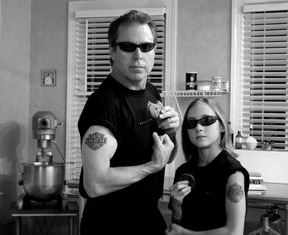Why I gave my competition a gift

Sometimes it’s nice to give your competition a gift
No question about it, turning down business is hard, especially in today’s environment. The very idea might seem counter-intuitive. It’s taken a number of years, plenty of dollars, and a few clicks on my personal odometer to get to the point where I understand not only the necessity of doing this in certain cases, but the importance to the success of a business that saying ‘no’ can provide. Many entrepreneurs suffer from the disease of trying to do everything for anyone, instead of sticking to what they can do well for the right customer.
I know there are those out there who will disagree. ‘Any business is better than no business’, I’ve been told. Certainly fresh recruits into the ranks of business development, hungry to make their mark, will feed on any order like hungry sharks at the first scent of any blood. And I know a few seasoned business people and entrepreneurs that chase after anything that increases the balance in the checking account. And that is okay – for those folks. ‘Different strokes for different folks’, as Sly sings.
So why would I turn down an order – a nice recurring order? I actually owe the idea of ‘gifting customers to the competition’ to John Costigan, a sales training expert that I’ve followed for awhile. I did this because I’m looking at the big picture of how our resources are allocated at Anna’s Gourmet Goodies, and the type of customer we are most successful at serving. And I’ve also learned that everything has a cost associated with it. Most people understand the cost of hard goods, but forget about the cost of your time, opportunity costs, etc. We all get precisely 24 hours each day. No more, no less.
A few weeks ago, I signed up for a barter service. I was familiar with these organizations, and for some businesses, they are a natural fit. I had never tried them before, but like most entrepreneurs, I’m always looking for ways to find new customers.
The barter rep called me a few days ago with a ‘potential deal’ from a member of the exchange. I agreed to take a look to see if it would make sense to us. The potential client then called to ask questions and place her order. I could tell from her questions that this customer might not be a good fit for our business. The warning light began to flash.
After adding up what she expected to order, I decided to take a closer look at what this would actually mean for our business, and to call her back. Bartering can be great, but we know exactly what we are going to buy and there simply was not going to be a way for us to spend the ‘barter dollars’.
The net effect to our business would be to give away our product for free. I could do this in hopes of recouping my investment at some later date. The investment includes ‘hard costs’ like butter, flour and sugar, as well as our time and labor costs. Whether you give away time or materials, you are loaning out money. To be profitable, you need to make sure you receive a return on that investment.
Ultimately, I passed on the order. The customer let me know quickly that she was going to a competitive cookie company if we would not ‘barter’ with her. Their products are significantly more expensive than ours to begin with, so she’ll end up paying two to three times the amount for gifts from ‘my competitor’, getting far less for their money than they would from buying direct from us. I don’t know if my competitor is happy with the deal or not, but I’m happy to not have to figure out how to manage with another form of currency while serving a customer that may not be a good fit that is essentially, getting product for free.
We had another phone call recently from someone looking for gingerbread cookies and I happily referred them to another company. A few years ago a very high profile client asked if we would make them cookies in the shape of stars. I passed. Could I have filled both of these orders? Yes. Would they have been profitable? No.
Being successful in business requires, among many things: capital, time, creativity, persistence and discipline. Like all successful entrepreneurs, I have enjoyed my share of success and failure in each of these areas, and I am learning with each step I take. The balance between being flexible enough to adapt to your customer’s needs and driving yourself and your business into the weeds can be a challenge. Was this the right decision? Time will tell.
The point of this article is not to debate the merits of the barter business, but to raise questions about focusing in on, and serving, the right type of clients that fit your business. Do we want more clients at Anna’s Gourmet Goodies? Absolutely! Are we going to make cookies shaped like cartoon characters, start baking cakes or do catering? No.
I’ve read ‘The Power of Focus’ a couple of times and I continue to work towards keeping my life and business tuned into the right channels. I even called my oldest (albeit not chronologically) friend, former business partner and fellow entrepreneur, Jim Plappert from ACH Payment Solutions and asked if my thinking on this subject is in check. “Chris, I agree with you 1,000%. I’ve learned the hard way that one of the keys to business success is to find your ‘sweet spot’ and strive to excel at serving those customers”. As the owner of a gourmet cookie company, I don’t think I could have put it any better.
So I’m happy to turn the oven off, enjoy a freshly baked, still warm, chocolate chip cookie and think about the other people that will be smiling today, tomorrow and next week because they are diving into a box of gourmet cookies we shipped to them. Now that’s what I call hitting our sweet spot.
Why I gave my competition a gift Read More »






